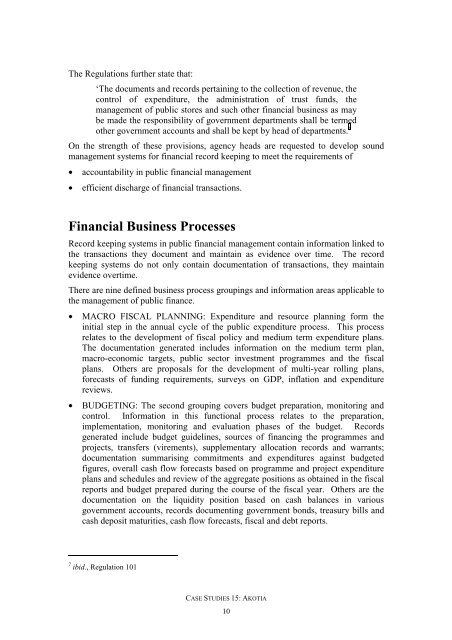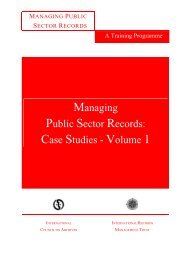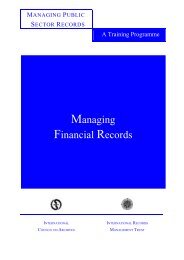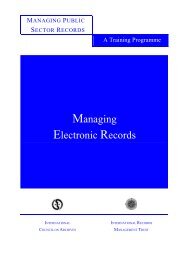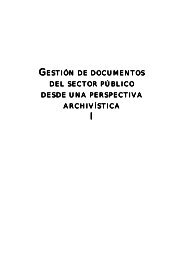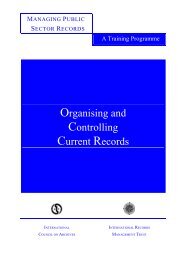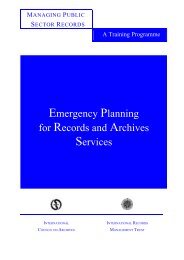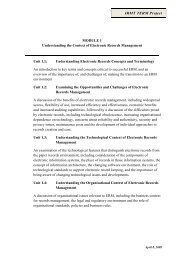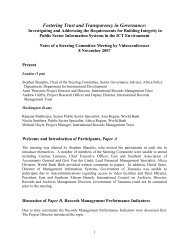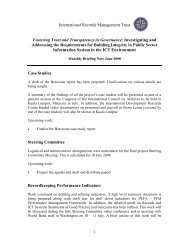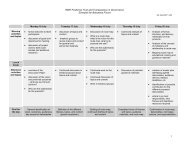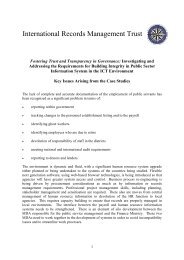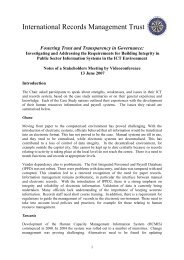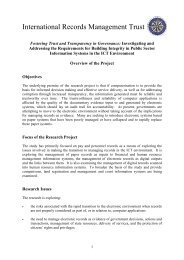managing public sector records: a study programme - International ...
managing public sector records: a study programme - International ...
managing public sector records: a study programme - International ...
Create successful ePaper yourself
Turn your PDF publications into a flip-book with our unique Google optimized e-Paper software.
The Regulations further state that:<br />
‘The documents and <strong>records</strong> pertaining to the collection of revenue, the<br />
control of expenditure, the administration of trust funds, the<br />
management of <strong>public</strong> stores and such other financial business as may<br />
be made the responsibility of government departments shall be termed<br />
other government accounts and shall be kept by head of departments. 7<br />
On the strength of these provisions, agency heads are requested to develop sound<br />
management systems for financial record keeping to meet the requirements of<br />
• accountability in <strong>public</strong> financial management<br />
• efficient discharge of financial transactions.<br />
Financial Business Processes<br />
Record keeping systems in <strong>public</strong> financial management contain information linked to<br />
the transactions they document and maintain as evidence over time. The record<br />
keeping systems do not only contain documentation of transactions, they maintain<br />
evidence overtime.<br />
There are nine defined business process groupings and information areas applicable to<br />
the management of <strong>public</strong> finance.<br />
• MACRO FISCAL PLANNING: Expenditure and resource planning form the<br />
initial step in the annual cycle of the <strong>public</strong> expenditure process. This process<br />
relates to the development of fiscal policy and medium term expenditure plans.<br />
The documentation generated includes information on the medium term plan,<br />
macro-economic targets, <strong>public</strong> <strong>sector</strong> investment <strong>programme</strong>s and the fiscal<br />
plans. Others are proposals for the development of multi-year rolling plans,<br />
forecasts of funding requirements, surveys on GDP, inflation and expenditure<br />
reviews.<br />
• BUDGETING: The second grouping covers budget preparation, monitoring and<br />
control. Information in this functional process relates to the preparation,<br />
implementation, monitoring and evaluation phases of the budget. Records<br />
generated include budget guidelines, sources of financing the <strong>programme</strong>s and<br />
projects, transfers (virements), supplementary allocation <strong>records</strong> and warrants;<br />
documentation summarising commitments and expenditures against budgeted<br />
figures, overall cash flow forecasts based on <strong>programme</strong> and project expenditure<br />
plans and schedules and review of the aggregate positions as obtained in the fiscal<br />
reports and budget prepared during the course of the fiscal year. Others are the<br />
documentation on the liquidity position based on cash balances in various<br />
government accounts, <strong>records</strong> documenting government bonds, treasury bills and<br />
cash deposit maturities, cash flow forecasts, fiscal and debt reports.<br />
7 ibid., Regulation 101<br />
CASE STUDIES 15: AKOTIA<br />
10


